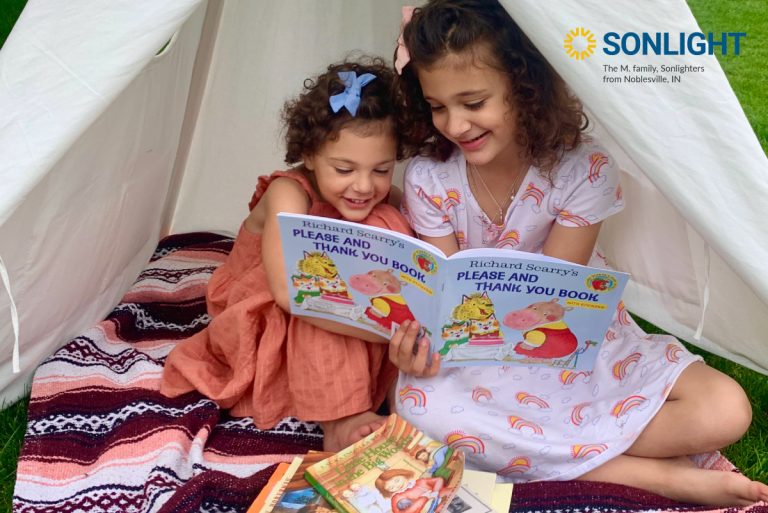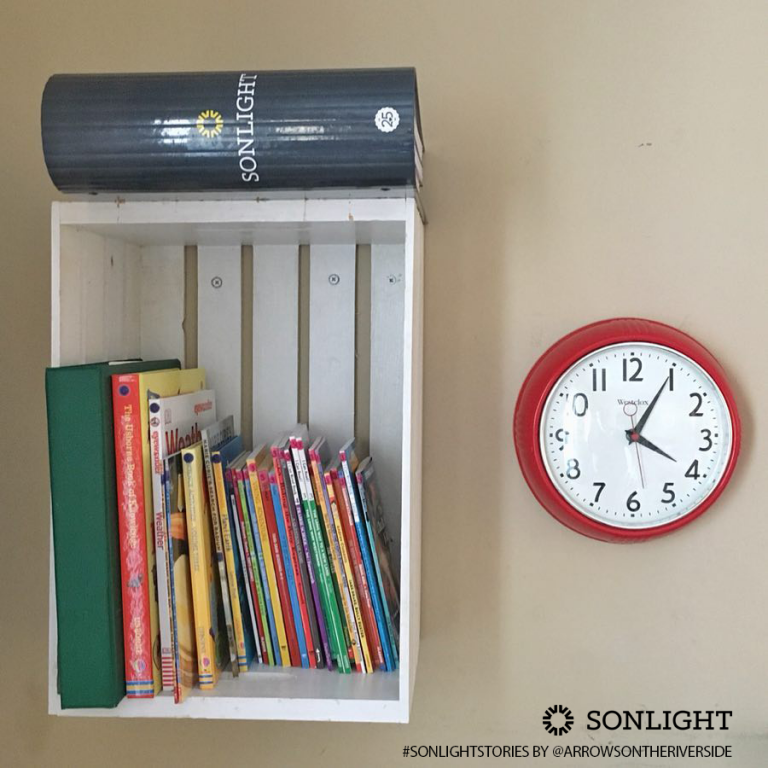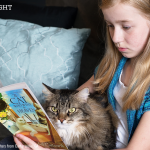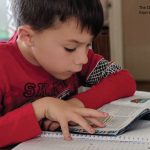I love books. And I love helping children learn to love books not only because reading is a great pastime. I also believe that reading and hearing stories read out loud should be central in every child’s education. So it’s no coincidence that reading great stories is the backbone of a Sonlight education.

I talk often about the benefits of reading, so I wanted to pull everything I could think of into one big list. And here it is! Enjoy this huge compilation of academic, developmental, and relational benefits that come with diving in to a good story.
1. Reading helps children remember what they learn
Bits of information devoid of context are difficult to remember. But put that same content into a story—give it context— and all of a sudden, it’s easier to remember. Stories serve as anchors for information that would otherwise be lost in the great sea of data in your mind. Learning about history from real books helps children remember what they learn.
2. Learning through books makes learning enjoyable
Not only do children remember information better when they learn it through a good story, they also enjoy the process! Children enjoy good stories far more than textbooks. And it’s just a lot more fun to teach kids who enjoy the learning process instead of trying to force-feed them.
3. Reading develops emotional intelligence and empathy
Research suggests that reading quality literature helps children develop empathy and emotional intelligence. When you read the Sonlight Read-Alouds to your children, they get daily practice walking in other people’s shoes as they follow the inner thoughts and experiences of characters very different from themselves. As studies suggest, reading helps us imagine what other people are feeling. What a vital life skill!
4. Reading improves children’s academic abilities
Reading helps kids perform better in other subjects. A recent study suggests that frequent reading is an even more important predictor of children’s academic success than is their parents’ financial status or level of education. One researcher suggests that the reason reading boosts scores in seemingly unrelated subjects like math is because the regular act of reading helps children practice taking in and processing new information.
5. Reading helps students understand the big picture of history
As children learn about history through biographies, historical fiction and story-based history books, such as A Child’s History of the World, they form a picture of what life was like at various times and places in history. They remember significant historical events because they’ve formed an emotional connection to characters who lived through them. They know more than just facts and dates; they understand why and how things happened as they did.
6. Read-alouds develop listening skills
Hearing you read aloud helps children develop listening skills. When children hear stories, they get practice translating words into meaning. That helps them in so many ways, and is a vital part of reading comprehension when they read on their own.
7. Reading grows kids’ brains
Reading out loud to your children enhances their brain development. One study compared young children whose parents had read to them often with children who had not heard many books read out loud. The young children who had heard many books showed significantly more activity in the brain’s visualization area (which is all about multisensory integration) when they listened to a story.
8. Reading helps kids learn to focus
As you read with your children, their attention spans will lengthen. In a world so full of distractions, the ability to focus on one task will be a huge advantage for this next generation. Even if children are playing quietly with something else while you read, their attention is set on that one story, instead of jumping from to Instagram to YouTube and back again. This ability to stay on one task is a vital skill in today’s world.

Sonlight students Samantha, Karlie and Brandon R soak up all the benefits of books on their favorite reading rock.
9. Reading can help develop character
Reading out loud with your children helps them develop character in a way that sticks. As kids see realistic characters face struggles, make decisions, and live with the consequences, they learn the meaning and value of virtue. The books you read help you discuss real-life scenarios with your children so they can truly grasp what virtue looks like. In this way, I think Sonlight’s literature-based approach is far more effective at forming character in the real world than moralistic tales or character-training curriculum.
10. Books provide great role models
Reading naturally helps children gain worthy role models. Life isn’t always black and white, and kids learn from the characters they meet in books who make good decisions, or who face consequences and grow from their bad decisions. We want our kids to gain role model— like those in great stories
—who have overcome great obstacles to succeed.
11. Reading helps children become culturally literate
As they read, children learn about the world and how it works. Sonlight Readers and Read-Alouds help your children develop the cultural literacy they need in life. As they enjoy great stories, they learn the background information they need to make sense of cultural references and the way our world works now. In other words, books provide the background knowledge so children can understand more of what they learn.
12. With read-alouds, kids can access concepts they can’t read on their own
Research shows that until eighth grade or so, kids can comprehend a much higher level of writing when it’s read out loud to them than they can when they read on their own. So reading out loud to your children all these years helps them access ideas, vocabulary and concepts that would otherwise be out of their reach.
13. Reading teaches vocabulary
The English language has far too many words to learn through conversation alone. Reading is the best way for children to learn the immense vocabulary they need in order to be educated adults. Even children’s books contain a much wider range of vocabulary than normal conversation between two college-educated adults. Two authors (Cunningham and Stanovich) reviewed all the research and report:
“Most theorists are agreed that the bulk of vocabulary growth during a child’s lifetime occurs indirectly through language exposure rather than through direct teaching. Furthermore, many researchers are convinced that reading volume, rather than oral language, is the prime contributor to individual differences in children’s vocabularies.”
In other words, kids have to read in order to develop a robust vocabulary.
14. Reading together fosters meaningful conversation
Reading out loud with your children opens the door to conversations about tough topics that are on their hearts. Reading real books together helps you be a huge influence in how they think about these things ... instead of letting them get all their information from their peers or mass media. Reading books together provides opportunities for your children to ask you questions about things they wonder about, such as love, loss, careers, family, and what it means to follow God. Reading together fosters meaningful conversations with your children
15. Reading aloud shows your children love
Reading together shares quality time with your children, and often includes important physical touch, when young ones sit in your lap. Those are two of the five love languages that Dr. Gary Chapman describes.
16. Reading together provides shared experiences
Reading out loud together helps your family create a reservoir of shared adventures to reference in your family culture, such as inside jokes or cultural references from books you’ve shared. This helps foster a sense of family and belonging, and helps your children feel like insiders in your family.

17. Reading aloud fosters family bonding
Relationships are built on shared time and shared experiences. Reading together gives you both. All the benefits of reading out loud with your children happen in what one author calls
“...the context of face time, of skin-to-skin contact, of the hard-to-quantify but essential mix of security and comfort and ritual.”
18. Reading relieves stress
Homeschooling with literature-based curriculum has a daily built-in stress reliever. One study suggests that reading for just six minutes can reduce stress by 68%. Many a frazzled day at home with kids is soothed when you get to sit down and sink into a good story together.
19. Reading out loud gives kids what they really want
One large survey about children and reading shows that school-age children wish their parents had kept reading to them after they learned to read on their own. Sonlight builds this precious parent-child time right into your school day. Even if your kids don’t want to snuggle like they used to during a Read-Aloud, know that they probably really enjoy that special time with you.
20. Reading helps children become great writers
Many writers agree that reading helps people learn to write. When children read good writing, they develop an ear for good writing. They learn the cadences, turns of phrase, and pacing of good authors. Sonlight’s Language Arts programs are based on this very concept. Dr. Ruth Beechick writes,
“Workbooks don’t really teach children how to write effectively.”
Instead, she says students best learn to write well as they listen to good writing, look at good writing, copy good writing, and then, finally, write on their own. Reading widely provides a great foundation for this process.
21. Reading helps develop critical thinking skills
When we read fiction and biographies, we learn to consider other people’s points of view. Children learn to walk in other people’s shoes. They learn to compare and reflect on different people’s thoughts and experiences. This is a key skill in learning critical thinking. In fact, Sonlight’s entire literature-based approach helps foster critical thinking skills naturally and more effectively than workbooks ever can.
22. Read-Alouds can motivate children to do their math
On a typical homeschool morning at the Holzmann house, we would get up and tackle math, language arts, spelling, and other more laborious work. But then came the really good stuff; we’d reconvene after a short break and dive into the day’s reading.
Three of my four kids would work diligently through their other subjects each morning because they knew that fun reading lay ahead. (I’ll admit that one of my children still needed extra encouragement to stay on task in the morning.) But for the most part, my children worked hard because they wanted to find out what happened next in their Read-Alouds and Readers.
23. Reading prepares children for a lifetime of unlimited learning
The sky is the limit for what we can learn in life. Adults who read regularly about what interests them will never stop learning. Learning to love books prepares children to keep learning their entire lives.
24. Reading aloud helps children love books
Whether children are still learning the alphabet or are preparing to graduate high school, they can tag along on thrilling adventures and learn that books are a true treasure. Time and time again, Sonlight families discover that reading aloud instills a love of books. After all, who doesn’t love to hear a good story?
25. Reading helps children love to learn
When children learn to love books, they also start to love learning in general. I’ve seen it time and time again. Sonlight’s literature-based learning turns reluctant students into students with a passion to learn. When books help you “do school” in such an enjoyable fashion, children discover that that learning is fun! And when children actually want to learn and do school (instead of dreading it), that can make all the difference in the world. It’s like the difference between feeding reluctant and hungry eaters. As one Sonlight mom says,
“The woman who swore that she would never homeschool LOVES it. Not to mention my kids!!” Can you imagine anyone saying that about a textbook or workbook-based program?
So, dive on into the adventure of learning together through books. You and your children will reap rewards far and wide! And I promise you’ll have a wonderful time along the way.
Sonlight makes the most of these 25 benefits of reading. Shop our courses and explore your options for a literature-rich curriculum.







Nice Article....Thanks for sharing helpful information.
Such wonderful reasons to support your excellent Program!
After reading this article, I am even more excited that I've chosen Sonlight for my children this year! I've been homeschooling for a few years now, and I could tell that my children needed something more/better. I've known of some of the benefits of reading in general, but this list has opened my eyes even more. Thank you for listing all of these benefits! I'm going to enjoy sharing this with others I know are just starting their homeschool journey, and others who are on the fence about it too.
Such a positive post! Reading together as a family is one of our favourite things to do!
My family has been using Sonlight for 9 years. Sonlight's Read Aloud books give us a time to get together as a family and discuss fun and difficult topics. My kids love books and when we leave the house they grab a book instead of a phone or tablet!!
What a great list! I wish I could keep it in a condensed format and fish it out every time I get in a conversation with someone about the benefits of reading and reading aloud. To this day - and my oldest is almost 20 years old - we still love read-alouds. Perhaps my oldest still sits on these reading times because he has had the longest exposure. He kinda just gets "pulled" in; he can't help it. . As far as my youngest, I was concerned that she missed out since we were not doing the reading aloud so much when she came along (everyone was off in some corner of the house doing their own reading). However, my wonderful husband pulled her into bedtime read alouds, and it became a father-daughter time. Really sweet. Now, she reminds him when they have gone too long without time relishing a book aloud.
I absolutely have fallen in love with reading with my children! Sonlight makes it so easy, the books that they select we all enjoy! When we did core B, everyone from my third grader all the way up to my 11th grader would gather around and listen to the stories and couldn’t wait for the next chapter! Someone once said if a children's book isn’t good enough For an adult to enjoy then it’s not worth reading. Sonlight has absolutely hit the mark with this! Thank you sonlight!
This was a great article. Yes I see how much reading has helped in childhood development. My daughter loves book series. She just finished 11th book this summer 'Judy Moody' has #12 to go. We also got her one of my favorites Nancy Drew. Thanks Sonlight for your wonderful read a louds and the encouragement it gives young readers.
Reading is such a great way to connect with our kids and I love that all my children love to read!
Reading also gives your child an opportunity to snuggle alongside you even in the midst of a busy day
This article is so powerful! Reading is essential in every part of our lives. This articles has a lot of great tips to show the importance of literacy often and early.
Thanks for this list of benefits! Reading to kids is so rewarding and I love hearing of all of these benefits.
Books have a special place in our home - to read and share!
It took me a few years to get the hang of read alouds, but now it's my kids' favorite part of our homeschool day! And now that some of them have graduated, it's kind of sad. I'm looking forward to having grandchildren that I can read aloud to again! P.S. You do not have to have a great read aloud voice with different voices for the characters. Just speak up and clearly. You'll get the hang of it!
I love this! One of my favorite things to do with my kids (5 and 3) is read, and I see most of these attributes as we read together daily - some I won't see until later I'm guessing! That bedtime story - we always make time for it because even if it's been a busy day, it provides that point of connection and bonding before sleep that strengthens our relationship and brings rhythm to our family. Thanks for sharing these!
I'm delighted you mentioned how reading fosters emotional intelligence and empathy in kids. I'll be sure to share this with my sister because it would be good for her small son's growth and development. I'll certainly look at boys' early reader chapter book series for them to help them to develop a love for reading while young. Thanks for sharing!